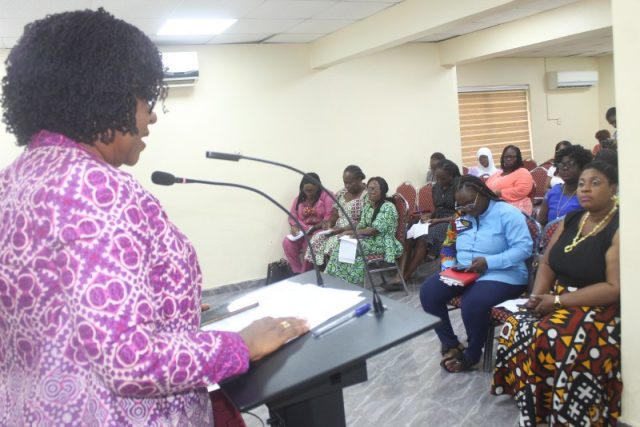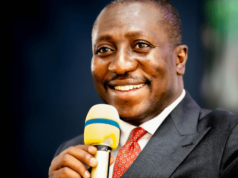By Rebecca Ekpe
Women’s Rights Advocates in Ghana are pulling all strings to ensure that the Affirmative Action (Gender Equality) Bill is passed before the current Parliament’s tenure expires as Ghanaians will head to the ballot box December 7, 2024 to elect a President and 275 members of Parliament.
The women among other things are pushing for a minimum 30% threshold for the inclusion of women in all positions, which is currently outlined in the AA Bill titled Affirmative Action (Gender Equality) Bill 2023.
Currently, in Ghana’s 2023 Parliament, there are 40 women out of 275 making it 14.45%, and representing a shortfall of 15.55% in the 30% quota representation on the table.
The Affirmative Action Bill is crucial in ensuring equal opportunities and representation of women in decision-making spaces and leadership, governance, the economy as well as practically in socio-economic development.
ABANTU For Development, Ghana has been spearheading a series of platforms to enable the conversations that would propel the enactment of the Affirmative Action (Gender Equality) Bill.
With support from the African Women’s Development Fund, ABANTU For Development, Ghana convened an advocacy session in Accra, with members of the Affirmative Action Bill Coalition and the Women’s Manifesto Coalition under the theme: “Enhancing Movement Building Efforts for the Passage of Ghana’s Affirmative Action Bill into Law”.
According to the Facilitator, Grace Ampomaa Afrifa with ABANTU For Development, the meeting ‘’is intended to strategically develop approaches on getting the Bill to be tabled for Second Reading and its eventual passage’’.
Why does Ghana need an Affirmative Action Bill?
Women have for many years been marginalized and despite some policy interventions in the past policies like the 1998 Policy on Affirmative Action have not worked effectively or made any changes, hence have not yielded the expected results. Besides, Ghana has to fulfil its side of the bargain of signing onto international obligation of equal opportunities for all.
Convenor, Affirmative Action Bill Coalition, Sheila Minkah-Premo (Esq.) speaking on ‘’Synergies for the passage of the Affirmative Action Bill into Law in Ghana’’, said ‘’there is enough justification for having this law in place’’.
Marginalization of women:
According to the latest Ghana’s Population Census, women make up more than 50% of the population, and research shows that they are marginalized when it comes to leadership positions in both public and private spheres’’.
Reasons accounting for this include socio-cultural factors, patriarchy, and stereotyped gender roles.
In Parliament for example, there are 40 women out of 275 making it 14.45%
“We have had only one female Speaker of Parliament since independence with the rest being male”.
Regarding the Executive, Madam Minkah-Premo says, ‘’We have never had a female President or Vice-President’’.
Ministerial positions have always had more men than women. There are more male than female Ministers. The Economic Management Team is composed solely of 7 males with no females on board.
The Council of State has 37 men and only 4 women.
In the Judiciary, there are more men in the Superior Courts as well as Lower Courts than women.
Convenor, Affirmative Action Bill Coalition said ‘’We have had only three female Chief Justices out of almost twenty chief justices appointed into office since independence’’.
Regarding Local Government, Ghana’s current representation of women in Local Government stands below 5%.
And in the Private Sector, what is reflected in the public sector is reflected in other corporate institutions.
Out of the 35 companies listed on the Ghana Stock Exchange, 38% have one or no female on their Board.
Constitutional provisions:
Article 17 of Ghana’s 1992 Constitution prohibits discrimination on the basis of gender with an exception in Article 17(4) which states that – “Nothing in this article shall prevent Parliament from enacting laws that are reasonably necessary to provide for the implementation of policies and programs aimed at redressing social, economic or educational imbalance in the Ghanaian society.”
Articles 35(5) & (6) also calls for gender balance in recruitment.
International Obligations:
Ghana is a state party to a number of international treaties and instruments calling for gender equity or parity in leadership positions.
These include international instruments such as the Convention on the Elimination of all forms of Discrimination Against Women (CEDAW), the Beijing Declaration and Platform for Action, the Sustainable Development Goals, especially Goal at the United Nations level as well as the Maputo Protocol and Agenda 2063 at the African Union level.
Madam Minkah-Premo said some African countries have activated Affirmative Action Laws to ensure inclusion.
‘’We are still lagging far behind despite being a beacon of democracy in Africa. Countries like Rwanda, South Africa, Kenya, Ethiopia, Senegal, Guinea Conakry and more recently Sierra Leone have achieved gender equality in governance especially with regard to the increase in the numbers of women in Parliament by Affirmative Action Laws’’.
Economically, it makes sense that women should be included in leadership positions, just one more argument for the passage of a Gender Equality Law in Ghana.
As it stands, the antidote to increasing participation of women in governance and addressing the obvious marginalization of women in Ghana, requires the enactment of an Affirmative Action (Gender Equality) law.

Convenor, Women’s Manifesto Coalition, Hamida Harrison sums it all up by saying “passage of the Affirmative Action(Equal Opportunity) Bill will be the contribution made today for tomorrow, because what we enjoy today has been made possible by the sacrifices and the toils of those gone before us”.















